Bichette available off the bench for Game 2
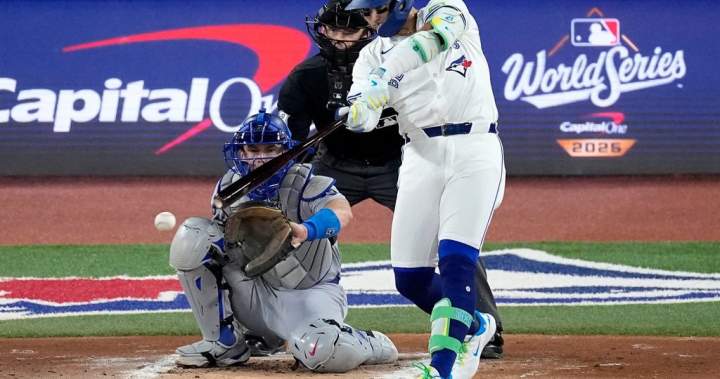
TORONTO – Blue Jays manager John Schneider made several moves to his starting lineup for Saturday’s Game 2 of the World Series against the Los Angeles Dodgers.
Infielder Bo Bichette, who made his first game appearance in seven weeks in Toronto’s 11-4 Game 1 win, was available off the bench. Isiah Kiner-Falefa got the start at second base with outfielders Nathan Lukes and Addison Barger drawing in for Davis Schneider and Myles Straw.
Normally a shortstop, Bichette made his first big-league start at second base after being named to the 26-man roster before Game 1. He had missed time with a left knee sprain.
Related Videos
“After the layoff, I didn’t want to like kill him, you know,” Schneider said in a pre-game media availability from his office. “So this is stuff we talked about even leading up to the decision to put him on the roster.

Get daily National news
Get the day’s top news, political, economic, and current affairs headlines, delivered to your inbox once a day.
“I thought he was good yesterday and just want to watch him physically. But he’ll be ready to hit and play whenever.”
Right-handers Kevin Gausman of Toronto and Yoshinobu Yamamoto of Los Angeles were set to start in Game 2.
Schneider also confirmed that Max Scherzer would start Game 3 at Dodger Stadium on Monday. Shane Bieber was tabbed for Game 4 on Tuesday.
If necessary, the Dodgers would host Game 5 on Wednesday. If Game 6 and Game 7 are needed, they would be played in Toronto.
Bichette had a single in the first inning of Game 1 and grounded into a double play in the third. He opened the Blue Jays’ decisive nine-run sixth inning with a walk before being replaced by Kiner-Falefa.
Bichette had a .311 batting average this past season and led Toronto with 181 hits.
This report by The Canadian Press was first published Oct. 25, 2025.
© 2025 The Canadian Press

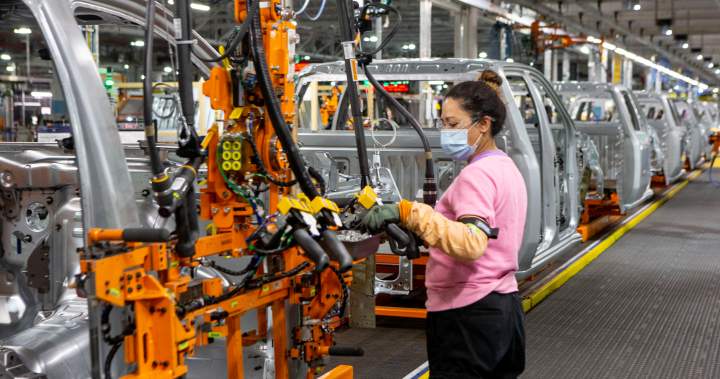
Canada’s automotive industry is sounding the alarm that it would be “very damaging” if more tariffs are put into place — and also that some vehicle manufacturers are voicing concern about being seen as “too American” in the tense climate.
This comes after U.S. President Donald Trump abruptly cut off trade talks and declared he would add a 10 per cent tariff on top of current levies in place on Canada — a move Trump said was because of an anti-tariff commercial produced by the Government of Ontario.
A panel of representatives from Canada’s automotive sector met with a federal standing committee in Ottawa Monday to discuss the “challenging” environment that tariffs and the trade war have created.
“It would be extremely challenging if more tariffs go into place, particularly if they apply to all products that currently qualify under CUSMA,” said Brian Kingston, president and chief executive officer of the Canadian Vehicle Manufacturers’ Association (CVMA).
“So we don’t know yet how these will be applied, but an additional 10 per cent will be billions of dollars in costs onto this sector (automotive) and other Canadian sectors. So very damaging and hopefully we can find an off-ramp.”
Trump was not clear if the additional tariffs would apply to all sectors, or specifically-targeted industries, and on Monday did not say when asked when those might go into effect.
Carney responded to Trump pulling the plug on trade negotiations, saying, “We can’t control the trade policy of the United States.”

Trump’s tariff policies mean products may face additional costs if they do not fall under the terms of the Canada-United States-Mexico Agreement (CUSMA), which is set for a formal review in 2026.
Companies in many sectors, including automotive, have been pivoting to find alternative trading partners and adjusting their supply chains to avoid, or at least minimize the cost impact from tariffs.

Get daily National news
Get the day’s top news, political, economic, and current affairs headlines, delivered to your inbox once a day.
Some car companies warned tariffs could see their profits drop by billions of dollars by the end of 2025, with some shifting or closing production in Canada, which has led to job cuts.
Stellantis revealed earlier in October that it was planning on moving production of the Jeep Compass from Brampton, Ont., to Illinois in the U.S. — leaving thousands of jobs at risk of being eliminated.
Kingston on Monday was asked about the job security for Brampton workers at the Stellantis facility, and he said “there are plans for the Brampton plant — it is not a plant closure,” without getting into specifics.
General Motors also said it is ending production of its BrightDrop vehicles in Ontario.
In light of the Stellantis and General Motors news, Industry Minister Melanie Joly formed a “response group” aimed at preserving jobs.
Kingston added that there could be further plant closures and potential job cuts “the longer time goes by without a solid trade deal” that makes Canada a “competitive” market for companies to invest in.
When companies are hit by higher costs, they typically will try to offset the hit to their profits by increasing prices for customers. This means by having to pay tariffs, companies like Stellantis may have to increase prices for car buyers.
“You’re going to see vehicle prices go up US$4,000, $12,00, $15,000 — I don’t think people signed up for that. That is a potential outcome, but I ultimately think we will find a landing zone,” Kingston said.
Huw Williams, the national spokesperson for the Canadian Automobile Dealers Association, told the committee one of his client’s concerns was how “a number of our dealers, Ford, GM and Stellantis are worried about the knock-on effect of being seen as ‘too American.’”
A recent Ipsos poll conducted exclusively for Global News showed six in 10 Canadians said they could never trust the U.S. again because of Trump’s policies.
Trump has also repeated rhetoric that Canada should become “the 51st state” to avoid paying tariffs.

The panel was adamant that the best way forward to support the Canadian automotive sector and its workers is to negotiate a trade deal that sees all tariffs removed for finished vehicles and components crossing the Canada-U.S. border.
“The best deal for Canada is a situation where we adhere to the rules that were negotiated under the previous CUSMA. If those conditions are adhered to, then that should be the basis on which we continue to have zero tariffs on automobiles going back and forth across the border — and that’s where we need to get to,” said David Adams, president and CEO of Global Automakers of Canada.
“I think some people are saying ‘that’s wishful thinking.’ Well, maybe that’s one of the reasons why the negotiations are taking so long is because that’s the ultimate goal here.”
Williams also suggested that having a long-term trade deal may be worth waiting for.
“We’re concerned about getting a long-term deal. Yes, we need short-term certainty, but the big prize out here is to make sure we have a CUSMA deal.”
© 2025 Global News, a division of Corus Entertainment Inc.
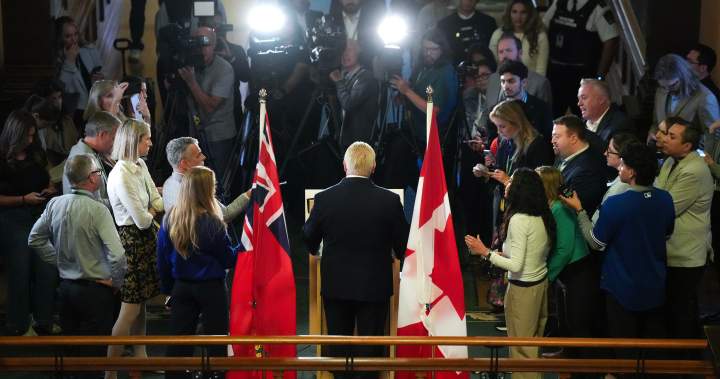
A defiant Doug Ford said the commercial his government launched last week, to the fury of United States President Donald Trump and derailing trade talks, has “achieved” its goal and will now end.
For the first time since Trump called off trade talks with Canada in response to the Ontario government commercial, the Ontario premier stood in front of journalists to proclaim the $75-million campaign a success.
“We generated a conversation that wasn’t happening in the U.S.,” Ford said. “The message is very clear: protectionism does not work and that’s the message we have for the American people.”
The Ontario commercial, which features former Republican president Ronald Reagan’s views on tariffs and protectionism, created an international stir when Trump terminated trade negotiations with Canada and applied a 10 per cent tariff on Canadian exports to the United States.
Prime Minister Mark Carney suggested the commercial was also the sole reason for the “unexpected twists and turns” in the talks, and emphasized that while he’s open to “unsolicited advice” on those discussions, the negotiations are the “responsibility of the government of Canada.”
“There were a series of very detailed, very specific, very comprehensive discussions, negotiations … up until the point of those ads running,” Carney said during an international summit in Asia. “I would suggest you take the president at his word.”

Get daily National news
Get the day’s top news, political, economic, and current affairs headlines, delivered to your inbox once a day.
After talks were terminated late on Thursday night, the Ford government locked down. Two news conferences were cancelled Friday morning, and the premier didn’t appear at Queen’s Park all day to answer questions.
By Monday, however, Ford went back on the attack. He told his critics during question period the commercial was “the most successful ad in the history of North America” and faced questions from journalists.
Faced with questions about how his commercial had apparently derailed trade talks he was not officially party to, Ford said the prime minister had seen the slot before it aired.
“He saw the ad before I put it out, so did his chief of staff — they both saw it,” the premier said.
After speaking to the Queen’s Park press gallery at the legislature, Ford was scheduled to make the rounds on American television, including ABC, CNN and NBC.

As he defended the commercial, Ford hardened his stance on trade talks, repeatedly suggesting the negotiations led by Carney could hurt his province.
“My job is to protect jobs here in Ontario, and one sector — there’s many sectors — one is our auto sector,” Ford said. “Hide nor hair, nobody’s speaking about auto, I’m speaking about auto, Lana Payne, the president of Unifor, is speaking about it.”
Ontario’s auto sector — which the federal and provincial governments have spent billions propping up — has been struggling under the weight of tariffs.
Recently, Stellantis announced it was moving 3,000 jobs from Brampton, Ont., to the United States, while General Motors announced it was ending production of electric delivery vans in the province.
The company tapped to produce the commercial that created the furor has ties to the Progressive Conservative party, Global News previously reported.
© 2025 Global News, a division of Corus Entertainment Inc.
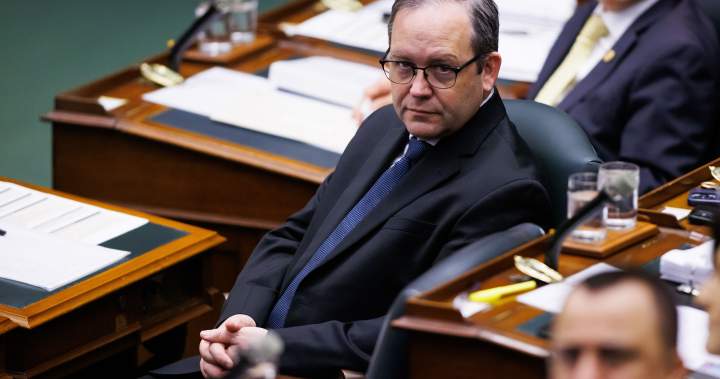
The Ford government has announced it is planning to dramatically increase individual donation limits for political parties in Ontario, scrap fixed-term election dates and allow governments to sit for five years in a potentially massive overhaul.
The sweeping changes to how elections will work in the province were announced through a news release by the provincial government on Monday afternoon, without either a technical briefing or a news conference.
In a statement, Attorney General Doug Downey claimed fixed election dates were “American-style” and said new rules would allow the province to be more flexible in the face of trade wars.
“With these reforms, governments will be better positioned to respond to changing circumstances and external threats, including by seeking a fresh mandate from the people of Ontario when it’s needed,” he said in a statement.

Get daily National news
Get the day’s top news, political, economic, and current affairs headlines, delivered to your inbox once a day.
Replacing fixed terms would allow the premier to call an early election, as Ford did in February 2025, or sit for a full five years.
Other major changes to how election campaigns and donations are regulated were announced at the same time.
- The limit on individual annual donations to a political party will be increased by almost 50 per cent from $3,400 to $5,000 beginning in 2026. The increase would then be indexed to inflation.
- The per-vote subsidy, which gives public money to political parties based on how many votes they receive, would be made permanent, rather than needing to be regularly extended.
- Strict spending limits on third-party advocacy groups — for example, unions — and political parties would be eliminated.
- Tighten the rules around third-party advertising registration and give Ontario’s chief electoral officer more investigative powers to deal with bad actors.
The province said it is also considering banning political advertising on government property, which would include billboards and transit stations.
The changes were not part of the Progressive Conservatives’ platform to fight against tariffs during the 2025 snap election, which they won in February.
Duff Conacher, the co-founder of Democracy Watch, said if the changes pass, they would continue a pattern of more money entering provincial politics.
“If the proposed hike goes through, Doug Ford’s government will have tripled Ontario’s political donation limit since 2018, creating an unethical, undemocratic pay-to-play, cash-for-access system that allows rich donors to buy even more influence over parties, politicians, government policies and decisions,” he said in a statement.
“The Ford PC Party’s proposal to end fix election dates and remove all limits on pre-election spending by political parties and lobby groups will make Ontario government policy-making processes and elections more unfair, unethical and undemocratic and driven by wealthy interests.”
© 2025 Global News, a division of Corus Entertainment Inc.
-

 Uncategorized5 months ago
Uncategorized5 months agoShop Proud, Eat Proud, Be Proud — Ottawa Canada Day Market This June 28th
-

 4 months ago
4 months agoRing of Fire road to bring prosperity to First Nation, problems for caribou: report
-

 5 months ago
5 months agoMeasles circulating in northeastern B.C. community, health officials warn
-

 5 months ago
5 months agoCanada’s world junior trial saw juries tossed, intense testimony. Here’s a recap
-

 4 months ago
4 months agoFormer major leaguer, Jays doctor Ron Taylor dies
-

 4 months ago
4 months ago161 bricks of suspected cocaine found on truck trying to cross Canada-U.S. border
-
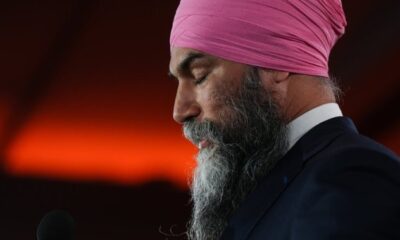
 4 months ago
4 months agoJagmeet Singh apologizes for attending Kendrick Lamar concert after Drake calls him out
-
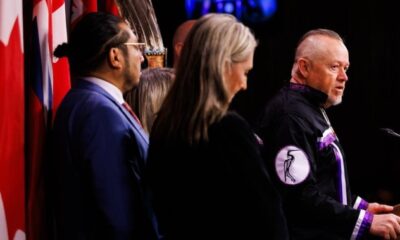
 5 months ago
5 months agoAnishinabek Nation chief says he briefed Ontario police on protests against Bill 5






